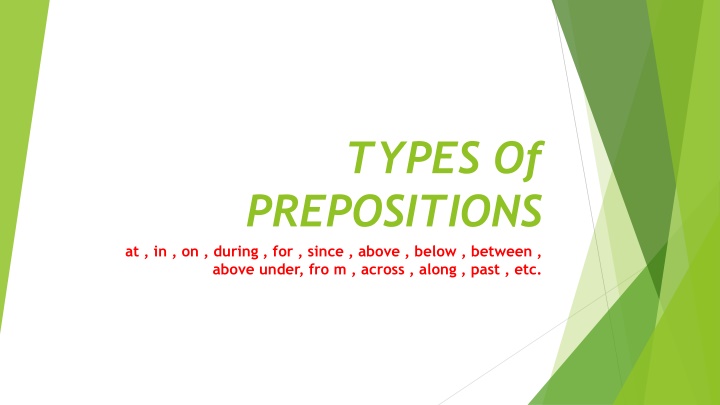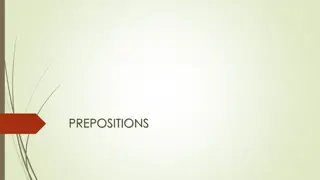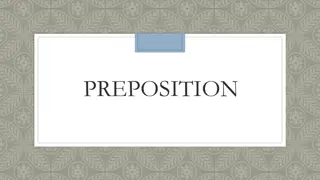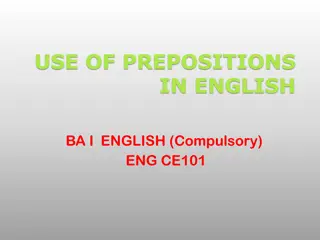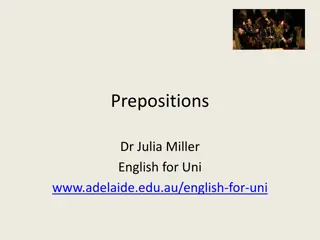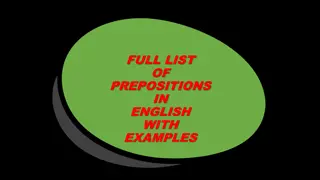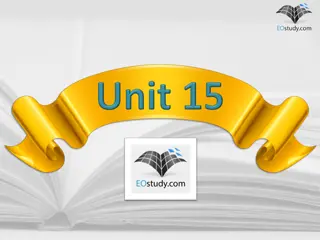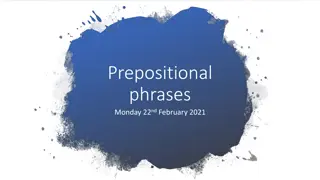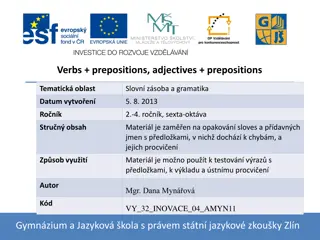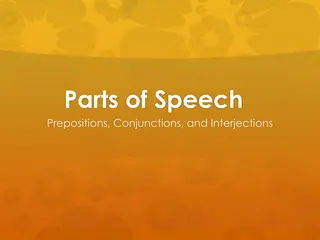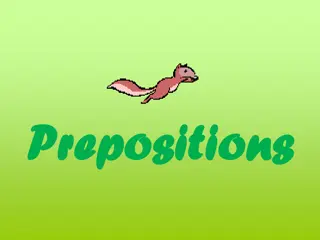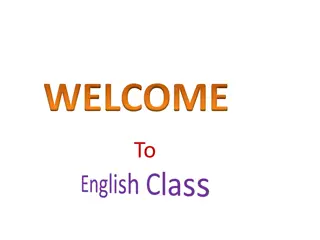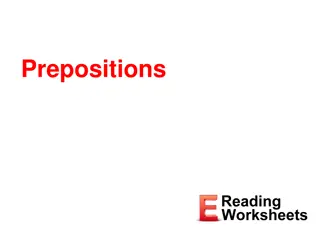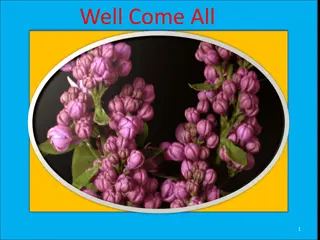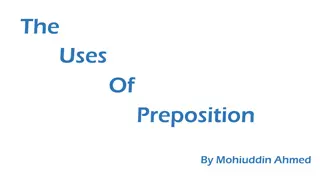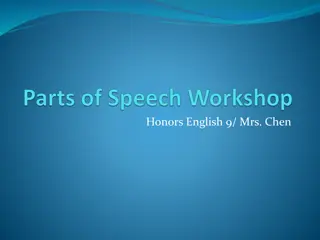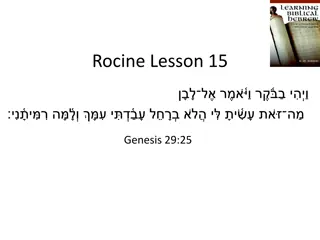Types of Prepositions and Their Main Uses
The provided content discusses different types of prepositions such as "at, in, on, during, for, since" and their respective main uses in English grammar. It covers prepositions of time, location, and duration, explaining how each preposition is used in various contexts with illustrative examples.
Download Presentation

Please find below an Image/Link to download the presentation.
The content on the website is provided AS IS for your information and personal use only. It may not be sold, licensed, or shared on other websites without obtaining consent from the author.If you encounter any issues during the download, it is possible that the publisher has removed the file from their server.
You are allowed to download the files provided on this website for personal or commercial use, subject to the condition that they are used lawfully. All files are the property of their respective owners.
The content on the website is provided AS IS for your information and personal use only. It may not be sold, licensed, or shared on other websites without obtaining consent from the author.
E N D
Presentation Transcript
TYPES Of PREPOSITIONS at , in , on , during , for , since , above , below , between , above under, fro m , across , along , past , etc.
1. Prepositions of Time at in on
Main uses of at 1. at : an exact point in time : The lessons begin at 8 and end at noon. 2. before names of mealtimes or general words for holidays: We ll see at breakfast. What do you do at Christmas. . at Christmas Day. 3. When we talk about person s age as a point in time. My father left the school at 17. At your age , I started driving.
Show the difference in meaning : We ll see them in the night . ( during a specific night ) We ll see them at night. ( during any night ) ======================================================== Uses of in 1. before the names of months , seasons, or years Summer time begins in March. She died in 2000. That museum was built in the 19thcentury.
We can use (in) for a period of time before something happens or is completed : She ll be back in an hour. I shall finish my work in two days. ============================================================= Some Uses of on : 1. with a specific day, or part of specific day and dates. I ll see you on Sunday. I ll see on Sunday morning. I ll see you Sunday. ( AE )
We can use (on) with special days or occasions : We ll be there on her birthday. What do you do on Christmas Day. We can use from and to for starting and end points in time The lecture starts from 8:30 to 9:30 .
Note : we can use past (later than) It s past eight o clock. during / in ( when something happens at some point within specific period of time) We ll be on holiday during/ in July. (for) ------- about a period of time up to the present time , and (since) when it started. We ve been here for hours. We ve been here since 2000.
(at, in, on) for location something is at a place , it is close to it not touching it We ll meet them at the bus stop. I heard someone at the door. . The money was in the box in a drawer in the desk in my office. It s just a small village on the river Tigris. ( when something on a place in contact with a surface ) VERBS AND NOUNS WITH (at, in and on ) They believe in life after death. They smiled at me. ( after verbs smile,shout,bark, laugh, scream, stare ..
Prepositions of Place: above,below,between,among . ( one thing is in the higher position than another ) She has a small scar above/over her right eye. Her name is above/over mine on the waiting list. ( when something at a higher level .) Are you above / over 21? Their flat is below / under ours. ( they are not in the same positions..) If you are under 21 , you cannot get into the club. The cost is under $ 40. I keep my money underneath my mattress. ( To emphasize covered by )
between & among ( We can talk about a place between two or more separate people or things or among more than two people or things together as a group ) Find Luxembourg on the map. It s between Belgium, France and Germany. Find Luxembourg on the map. It s among the countries of Western Europe.
Prepositions of Movement and Place : from , across , along , towards, from to . I can walk from my house to work. His car is coming towards us ( in the direction of ) It s a step toward peace. ( AE. ) into / onto We are poring some tea into the glass. Paint was dripping from his brush onto the floor. ( movement to place inside something or movement to a surface of some kind )
Prepositions Used For Connections : of , with , by , We use of and with when we talk about people and things being connected and related together The sleeves of his shirt are too short. I am looking for a shirt with long sleeves. He used to sleep with his elder brother. of and with can be used with some adjectives: ( afraid of , aware of , full of , fond of . ) .. He is afraid of dogs. ( faced with , familiar with , satisfied with , associated with ..) She is wasn t familiar with the teaching linguistics. I wasn t satisfied with my new work . - We can use with + determiner with a specific thing : He broke the lock with a knife . by a knife I paid with/by a credit card. He opened the door by breaking the . - (( by phrases : by car, by air, by e-mail , by phone ..))
Prepositions used for exceptions : except, besides, without , apart from , minus , except for ( not including ) : It s open except (for) Saturdays. I work here except for on Fridays. Between clauses : I never heard her child except when it gets tired. besides ( in addition to ) : Besides grammar , what other subjects do you like to learn? I ve talked to everyone besides Jack. without / minus : ( not included ) We usually drink tea without/minus milk in the morning.
Phrasal Verbs : (two-word verbs) a verb + particle combination suck sleep in or put on A group of words that function as a verb and is made up of a verb and a preposition , an adverb , or both . verb + particle : ( fall over, run away, come back ,put on , take off ) He put on his shoes. ( with object) At last, she came back. ( without Object ) You will wake them up . ( Object in the mid. Position ) Have you given up smoking? ( Gerund after phrasal verb ) Verb + Particle + Preposition : ( face up to , get round to , look forward to, watch out for , catch up with .. ) : I ll catch up with you later. They look forward to getting the highest marks in the final semester. She faced up to my fears. It always gets me ages to get round to writing letters. Watch out for bats in the caves , they are dangerous.
